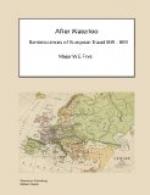The weather has set in very cold and the Elbe is nearly frozen over. It is impossible to go out of the house without a Pelz or cloak lined with fur; for otherwise, on leaving a room heated by a stove, the effect of the cold is almost instantaneous and brings on an ague fit. This I attribute to the excessive heat kept up in the rooms and houses by the stoves. As smoking is so prevalent here, this contributes much also to keeping the body in a praeternatural heat and rendering it still more obnoxious to cold on removal from a room to the open air. It has been remarked by a medical author, in the Russian campaign in 1812, that the soldiers of the southern nations and provinces, viz., Provencaux, Gascons, Italians, Spaniards, and Portuguese, endured the cold much better and suffered less from it than the Germans and Hollanders. The reason is sufficiently obvious: the former live in the open air even in the middle of winter and seldom make use of a fire to warm themselves; whereas the Germans and Dutch live in an atmosphere of stove-heat and smoke and seldom like to stir abroad in the open air during winter, unless necessity obliges them. Hence they become half-baked, as it were; their nerves are unstrung, their flesh flabby and they become so chilly, as to suffer from the smallest exposure to the atmosphere. In the houses in Germany, on account of the stoves, the cold is never felt, whereas it is very severely in Italy and Spain where many of the houses have no fireplaces. On this account I prefer Germany as a winter residence, for I think there is no sensation so disagreeable as to feel cold in the house. In the open air I do not care a fig for it, for my cloak lined with bearskin protects me amply. The climate here in winter is a dry cold, which is much more salubrious and agreeable to me than the changeable, humid climate of Great Britain, where, though the cold is not so great, it is much more severely felt.
[126] Tacitus, Germania, C, VIII.—ED.
[127] Martin Sherlock (d. 1797), author of Lettres
d’un voyageur anglais,
which were published
in Paris 1779 and, the year after, in London.
[128] Matthew Gregory Lewis, 1775-1818, published
Ambrosio or the Monk in
1795.—ED.
CHAPTER XVIII
MARCH-APRIL 1819
Journey from Dresden to Leipzig—The University of Leipzig—Liberal spirit—The English disliked in Saxony—The English Government hostile to liberty—Journey to Frankfort—From Frankfort to Metz and Paris—A.F. Lemaitre—Bon voyage to the Allies—Return to England.




